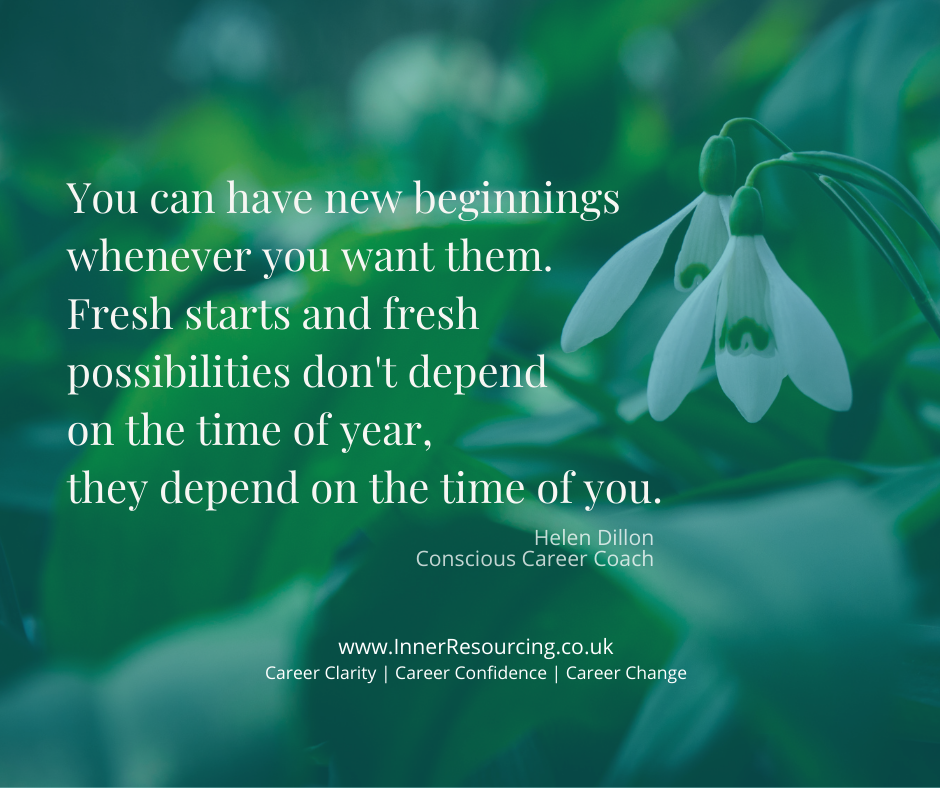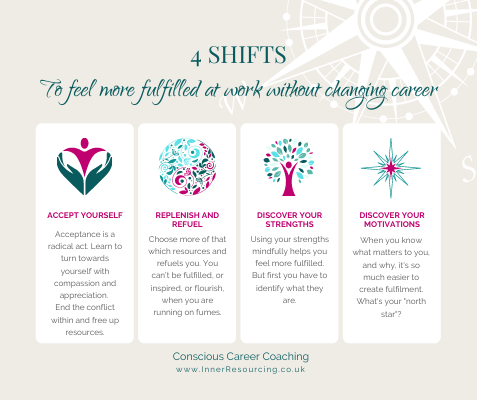How to feel more fulfilled at work without changing career
This article explores four shifts you can make to feel more fulfilled and inspired at work without leaving your current role. You’ll also find signposts to resources, plus questions to support journaling about career, career change, and fulfilment at work.
There’s a lot you can do to feel more fulfilled at work.
Even when you’re feeling stuck in your current role and career change doesn’t seem like it’s an option.
I believe we need to talk about this more.
Because, for every woman who is ready and able to change career in order to do more meaningful work, there’s another who feels trapped in a corporate job that no longer fulfils or inspires her.
Because reasons.
Reasons like lack of resources or opportunity, for instance. Too many heavy responsibilities weighing you down. Or simply not knowing what else you might want to do.
Does that mean you just have to live with feeling unfulfilled at work?
I don’t believe so.
I believe there is a lot you can do, from where you are right now, to create more fulfilment and flourishing at work.
So read on for my top tips for how to feel more fulfilled at work, without changing your career.
Many people are taking a long hard look at their careers right now
Both academics and commentators are talking about what’s being called “The Great Resignation”. (A prediction that a third of workers will be actively looking for new jobs in 2022).
This unrest is seen as being a result of the pandemic, lockdowns, and furlough, bringing existing dissatisfaction with work into more focus. Not to mention a large number of professionals discovering remote working for the first time.
More importantly, many people are also asking themselves more existential questions to do with how we live, and what we live for.
However, while many professionals (as many as 1 in 4 in the US according to a recent Microsoft poll), might be thinking about leaving their jobs, that doesn’t mean they actually will. Or, that if they do, they will be able to find more fulfilment in another organisation.
Career fulfilment isn’t only about what you do, it’s also about how you do what you do.

You too may be asking yourself big questions about career fulfilment and what it’s all for
While the “Great Resignation” or “Great Awakening” (as it’s also been termed) may now be a widespread phenomenon, this kind of waking up ISN’T new.
In fact, it’s not uncommon for professional women in their 50s to start looking around and asking themselves what I call “The 4 Compass Questions” for career fulfilment:
- “Who am I?”
- “Which way now?”
- “What matters?”
- “Is it finally time to put me first?”
In fact, if you’re exploring these kinds of issues in relation to your work, then, in my opinion, you are already in career transition.
Which doesn’t necessarily mean you’ll change job or career path. (As I said above, sometimes it’s as much about how you do as what you do as what you do.)
Not every woman asking herself these questions is in a position to look for meaning and fulfilment in another type of role.
- Maybe you have too much invested in your current career and you’re not yet prepared to give it all up
- Maybe you’re just waking up to the possibilities of a more fulfilling career and the way ahead is fuzzy
- Chronic self doubt and self-criticism might be a factor,
- Or, perhaps you’re simply too depleted from the last 2 years of upheaval and trauma (on top of the last 30 years of putting everyone else first).
Sound familiar?
That doesn’t mean you’re stuck feeling unfulfilled and fed-up.
For sure, focusing on answering these compass questions up-front is key to making rapid, successful career shifts. (Which is why most of my clients start with coaching for career clarity before moving on to my Career Change programme.)
But, here you are, feeling unfulfilled, maybe burnt out, maybe just bored, by a role you feel you can’t move out of right now.
Something is missing and you don’t know what.
You’re wondering what to address first
From my work with women at career crossroads, I’ve identified four shifts that help create more fulfilment and flourishing. And these 4 shifts can be experimented with wherever you are in your career.
In a moment, I’ll go into each of these shifts in more detail, and discuss how they can deliver more fulfilment in your current role.
But just before we dive into that, there’s something else you might need to hear.
Before you think about being more fulfilled at work
I watched someone close to me struggle with a toxic work environment for about 18 months. The impact on their mental health was severe and the ripples continue several years later. In addition, I’ve coached several women who’ve been bullied at work and I’ve heard stories that would make your hair curl.
I’ve also experienced bullying and toxicity in the workplace myself. I remember feeling as if I was actually being poisoned each time I had to deal with the person involved. (Luckily I knew there was a definite end point because of the nature of the project.)
These experiences influenced my shift to career change coaching from more general life and business coaching.
We need to prioritise our mental health as we would our physical health.
Of course a fulfilling career is part of this but without being able to flourish, feel safe, and enjoy being at work, it’s not enough.
Realistically there’s little chance of you creating a fulfilling work-life in your current role if your workplace is toxic, and/or the bad behaviour of colleagues is affecting your health.
If this applies to you then Shifts 1 and 2, below, will still be relevant for you, and, I’d recommend also looking at resources that will help you improve your resilience, manage stress, and protect your mental health.
Creating more fulfilment at work, without changing career:
The 4 Shifts
Shift 1. To Be More Fulfilled at Work: Shift towards being OK with who and where you are

You are dealing with a lot. And you are doing your best.
I’m writing this in January, full in the knowledge that this time of year comes with its own particular stresses. The “New Year – New You” crowd will, no doubt, be out in force by the time you read it.
At the same time, we’ve just spent 18 months in a pandemic. There’s a new tragedy or crisis on the news every night.
It’s no wonder we’re all feeling exhausted and more than a bit traumatised.
That includes you.
You don’t need, in addition, to be beating yourself up about the things you haven’t done, haven’t yet achieved, or don’t currently have the energy to change.
Instead, see if you can turn towards yourself with compassion and appreciation. Free up resources for change when you learn to resolve the conflict within, end “self-sabotage”, and disarm your inner critic.
This first shift is a shift towards self-acceptance.
Getting started with Self-acceptance
The primary step is to recognise that choosing to be self-accepting is a radical act. Our whole consumer society is built on the premise that you are not enough as you are, in order to sell you things you don’t really need. Even much of the self-development industry buys into this “you have to grow, you have to improve yourself” mantra.
How would it change things for you if, instead of seeking self-improvement, or chasing your “best” self, you thought in terms of softening, deepening, and loving what’s here?
You’ll see in Shift 3, when you look at strengths, that you have all you need to get started, when you remember who you are.
For many women, the Inner Critic seems to be the main obstacle to self-acceptance. For a helpful exploration of what’s behind the Inner Critic, read this article: “Revealing the Limiting Beliefs Lurking Behind Inner Critic Attacks“
And get hold of my guide to “Stopping the Inner Critic” – it’s free to access (pdf – opens in new tab)…

Shift 2. To Be More Fulfilled at Work: Shift towards practising what resources and refuels you

Yes. I’m talking about self-care. But self-care-with-a-purpose beyond just getting you through the day. Or taking your mind off things.
I’m not so much pointing to “hot chocolate moments” (regardless of how great those are) rather towards practices that are not only self-soothing, but also replenishing.
This might mean choosing more of what you already know works, for instance:
- being gentle with yourself
- better sleep routines
- spending time with people who really see you
- soaking up images of beautiful places
- more dancing
- more hugs
- building nourishment into every day
- time in nature
- practising mindfulness and other presence-oriented practices, like Focusing
- stretching and other ways of reconnecting to your body
- keeping a “delight journal” recording ideas, dreams, desires, satisfactions, and appreciation
In summary, making more of whatever helps you feel grounded and resourced into a practice.
Also notice I’ve said “choose more” not “do more”. Because I’ve spotted in myself a tendency to treat self-care as something else to be added to my to-do list. And I want to flag this for you too.
Quite often refuelling can get shoved to the bottom of my list because of all. the. things. Or dropped off entirely.
So I’m experimenting with taking self-care off my “to do” list and putting it on a “things I actually do” list.
Choosing more of something nearly always means choosing less of something else. Choosing self-care only works if you create space for it. And protect that space. This is how you turn haphazard experiences into a sustainable and sustaining practice.
This shift requires mindful, loving self-care, that answers the Compass Question “Is it finally time to put me first?” with a resounding YES. Additionally, saying “No” is also a key skill to develop in this shift.
So, probably, less mindless scrolling, less setting unachievable goals, and less comparing yourself to others will also be helpful.
What will you choose more of? And less of?
Getting started with Refueling Yourself
You probably already have a sense of what is needed here. Try reflecting on, and perhaps journaling around, the question “What stops me from resting and refueling regularly?”
Pick an activity from the list above or come up with your own. Now ask yourself the following:
- What am I ready to give up in order to have a regular supply of this in my life?
- What would making this a regular practice involve?
- How can I start making this into a practice in a small way?

NOTE: You may be thinking: Yes, yes, Helen, “self-care” and all that – but what does this have to do with feeling more fulfilled at work?
The answer is that self-compassion, appreciation, and refuelling yourself are KEY to feeling fulfilled.
Because you can’t be fulfilled, or inspired, or flourish, when you are running on fumes. Or caught in a head-loop of “how you are failing”.
If you’re not able or ready to change role or career, change has to come within yourself. (And, in truth, inner change will be required either way.) This needs fuel.
If you change nothing, nothing will change.
Shift 3. To Be More Fulfilled at Work: Shift towards your “Signature Strengths”

Studies have shown that using your strengths mindfully helps you feel more fulfilled. But first you have to identify what they are. Strengths are those things that come easily to you, your go-to ways of approaching things.
What we’re looking for here are the qualities or attributes that make you, you.
Bear in mind that this is not so much about skills per se, though it’s helpful to know what you are skilled at too. But it’s more to do with how you go about using your skills, as distinct from the skills themselves.
For example, you may find it easy to see the big picture where others are getting bogged down in details. Or perhaps you are highly aware of relationships and love to help the people around you work better, or get on with each other better. Or you may know you’re really great at persevering despite challenges, or when bored.
Once you have a feel for what your strengths are, you can move on to noticing when you are using them. And notice what happens in you, and in others, when you do.
This shift is partly about discovering who you are, and partly about enjoying who you are.
Getting Started with Your Strengths
Getting to know your strengths starts by becoming aware of them.
Look out for the obvious. My top 3 signature strengths are Curiosity, Creativity, and Love of Learning. Well duh! These are totally me. Yet they are so much a part of who I am that I didn’t see them until they were pointed out.
Sometimes it’s helpful to ask friends, family, and colleagues. Try these questions:
“I’d like some feedback about what, in your opinion, makes me good at my job?”
“For what, am I your ‘go-to’ person?”
“Pick 3 or 4 adjectives that you would use to describe me”
Another way to discover your “signature strengths”, is an established self-awareness survey. For example, the VIA Institute’s “Values in Action” assessment. This is a particularly useful assessment tool, in my opinion, because it doesn’t try to fit people into preset categories. It’s not about “types”. Or telling you “what” you are. I often recommend it to clients. The basic report is free.

Enjoying this article?
Read next…. Embodied Ways to Help Your Stressed Brain to Focus
Shift 4. To Be More Fulfilled at Work: Shift Towards Understanding Your Values and Motivations

To feel more fulfilled at work, you need to be clear about what matters to you. And aware of your values and how they can be honoured at work.
Most of us are motivated in two ways:
There are things we want to move towards, or to bring more of into the world. And things we want to move away from and have less of. Both are relevant for purpose and motivation.
(Note: Sometimes the things we want to avoid are within ourselves, like difficult feelings, or what you might think of as “negative” thinking. Trying to avoid these can take up so much energy and attention that there’s none left over for choosing what we DO want. If this sounds familiar, then Shift 1, which is about self-acceptance, will be extremely important for you.)
It can be helpful to consider motivators from the point of view of “needs”. For example, here is a list of needs from Non-violent Communication. NVC asks you to sense what need you are trying, and failing, to have met when you experience interpersonal conflict. Check them out to see whether any of these words resonate for you.
This shift is about answering the question “What matters?”
Getting Started with Your Motivators
As with strengths getting to know what motivates you starts by becoming more aware.
Some helpful prompts to ponder around what fulfils you at work. Use these as jumping off points for journaling also:
- What do you care about?
- What are you doing when you feel most alive?
- The world needs more… what?
- If you could change anything at all at work, but one thing only, what would that be?
- Imagine you’ve had a tough week (probably not too hard to do!). Your boss asks you to stay late on Friday. What would have you saying “Yes” willingly?
And conversely…
- What irritates you?
- Someone at work is starting a petition – you’d be most likely to sign it if it were about …?
- What or who are you most afraid of becoming? Because….?
- Think of someone who annoys you or saps your energy. What are the qualities they’re bringing that you don’t want to reproduce?
- Try writing your “anti-obituary” – the way you would most NOT like to be remembered, and the things you would hate to have said about you after you’re gone.
Now pick one of your top motivators and brainstorm ways of bringing that into your work more. (NB There are no right and wrong answers here.)
If you like journalling, you may find it helpful to use these questions to kick start your writing. (There are more journal prompts for career fulfilment here…)
Summary: Four shifts for more fulfilment at work without changing career…

Feeling more fulfilled at work comes first from knowing yourself better
I hope you can see that there are a lot of things you can do to improve your self-awareness. And better understand what motivates you, as well as what you bring to the table just by being you.
Being more fulfilled at work starts with being more present to who you are and what’s important to you.
But career transitions of any kind take effort and application. (Whether that’s actually changing to a different career path, or changing how you approach your existing work-life in order to feel more fulfilled in the work you’re already doing.)
Which is why self-care becomes even more important than usual.
When you feel resourced and refuelled, and you accept yourself in all your messy brilliance; plus, you practice using your innate strengths and moving towards what matters, you will feel more fulfilled at work. Even without changing your current role.
I hope you can notice how the 4 shifts discussed above work together to strengthen and deepen your ability to:
- be present
- love yourself
- believe in yourself
- know what matters
- and put flourishing and more fulfilment at work front and centre
And sometimes working through these kinds of questions makes it even more obvious to you that you’re in the wrong role, or the wrong industry altogether. That’s when you have to go back to the reasons you feel stuck in the first place…
Above, I mentioned the contributing factors of: how much you’ve invested in getting to where you are, lack of clarity about what’s next, chronic self-doubt, and depletion. Whether it’s some combination of these, or something else entirely, you’ve probably some untangling to do.
If you need a helping hand and/or a listening ear to work this stuff out, that’s what I’m here for. Career Compass Coaching might be exactly what you’re looking for…

Pingback:23 Proven Journal Prompts to Unlock Your Career Change Success ⋆ Inner Resourcing